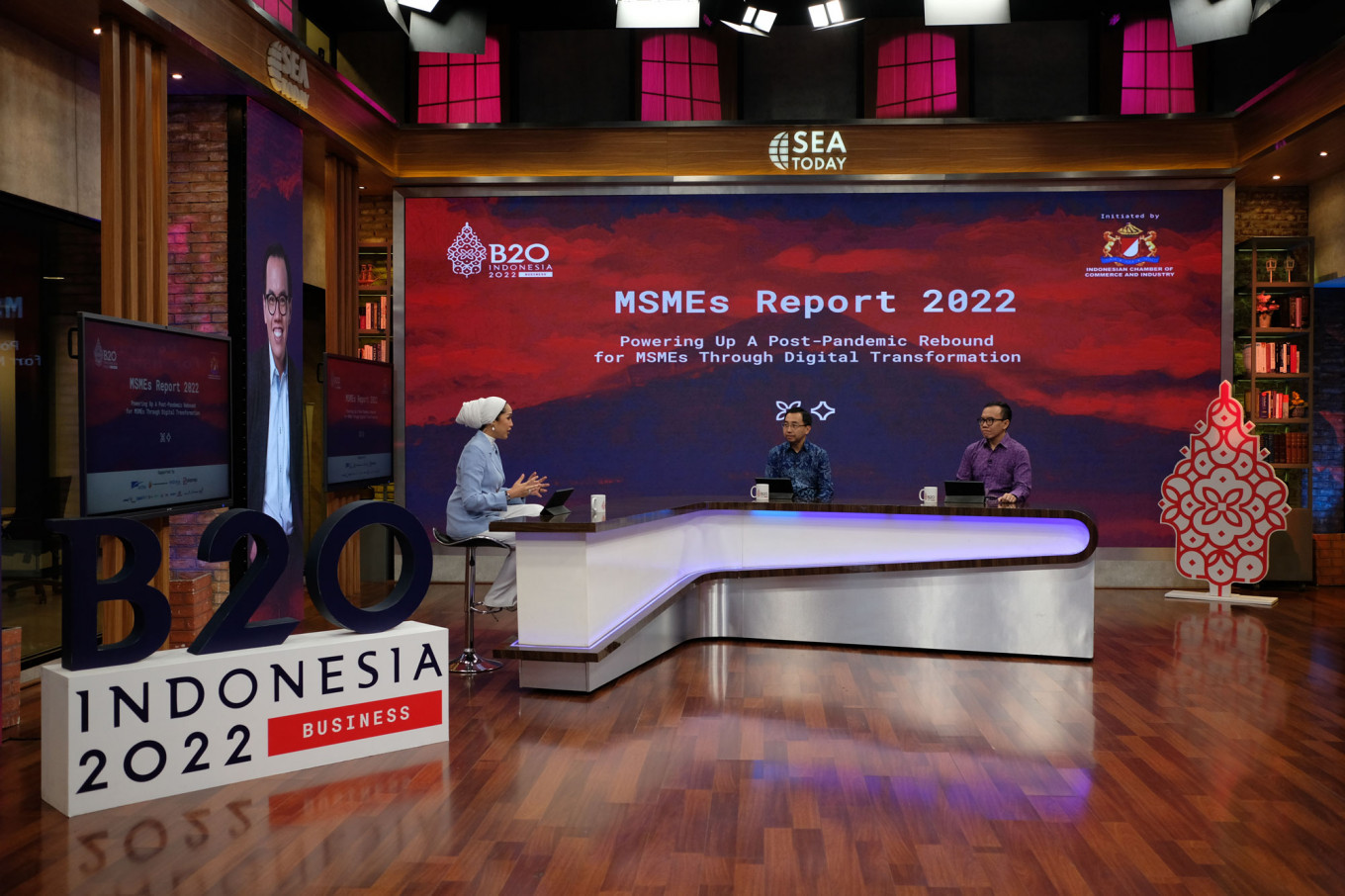Popular Reads
Top Results
Can't find what you're looking for?
View all search resultsPopular Reads
Top Results
Can't find what you're looking for?
View all search resultsTelkom Indonesia, BCG release report on post-pandemic rebound strategy for MSMEs
Change text size
Gift Premium Articles
to Anyone
M
icro, small and medium enterprises (MSMEs) today play a vital role in the world’s economy. As much as 90 percent of global businesses and half of global employment rely on MSMEs.
For Indonesia, MSMEs account for 99 percent of businesses and 60 percent of the GDP, making them an inseparable part of the national economy.
One contributing factor to the impact of MSMEs is digitalization. More than 60 percent of Indonesian MSMEs already utilize digital platforms in finding suppliers and conducting customer outreach, as reflected by a study done by Boston Consulting Group (BCG) and Telkom Indonesia titled “Powering up a post-pandemic rebound for MSMEs through digital transformation”.
The report, released in a special program titled MSMEs Report 2022 by SEA Today on Thursday, found that MSMEs faced enormous challenges during the COVID-19 pandemic. Many were forced to close their businesses, while others suffered significant revenue challenges resulting in liquidity shortages.
“Research undertaken by BCG into pandemic impacts on Indonesian enterprises reveals that 55 to 70 percent of MSMEs experienced declines in revenue, with the share of impact evenly distributed across enterprises of all sizes and sectors,” explained Davids Tjhin, managing director and partner at Boston Consulting Group.
Davids also said the report’s theme was in line with the B20 Digitalization Task Force’s objectives, which seek to bridge the digital divide to create inclusive growth.
Fajrin Rasyid, B20 digitalization deputy chair and Telkom Indonesia director of digital business, said MSMEs formed a key pillar of the Indonesian economy, employing over 117 million individuals as of 2018.
“These enterprises are significant local employers, providing opportunities and jobs to local communities, and with clearly stated commitments to empower the local economy,” he said.
Fajrin noted that digital transformation provided an important platform to support opportunities for MSMEs during and after the pandemic.
“Digital technologies can provide invaluable tools to ensure business continuity while accessing new and emerging markets nationally, regionally and globally. These technologies also provide a rewarding pathway to enhance operational efficiency, optimize processes and ways of working and reduce ongoing business costs,” he said.
To fully realize the benefit of digitalization for MSMEs both during and after the pandemic, barriers such as financial constraints, lack of skilled labor, lack of infrastructure, lack of availability of the technology, absence of standards and inadequate support from the government need to be addressed with priority.
According to Davids, analysis of the Indonesian MSME landscape reveals similar findings, with a range of barriers identified across funding, human capital, government-related challenges and technical and business implementation.
“Funding support is the most significant challenge [at 57 percent], followed by difficulties in digital training and learning centers [49 percent], regulatory support [43 percent] and the need for business consulting or mentoring services [32 percent],” he explained.
Fajrin acknowledged that the journey through digital transformation was not a simple one, and MSMEs face numerous strategic challenges alongside the wider ecosystem barriers that must be overcome.
What it takes for MSMEs to go digital
The “Powering up a post-pandemic rebound for MSMEs through digital transformation” report provided three strategic pillars and three enablers to support MSMEs’ digital transformation and overcome the barriers presented in the study.
Strategic pillars
- Product
Technologies such as big data and market intelligence can be utilized to establish product-related strategies and planning. Digital tools can also transform R&D efforts by optimizing return on investment through efficient and effective spending allocation. Digitalization also enables MSMEs to make data-driven product-related decisions and execution.
- .Operations
Digital solutions will help MSMEs to source and engage new suppliers through online collaboration and e-commerce platforms. Technology such as cloud computing can also facilitate collaboration and enable MSMEs to build IT infrastructure in a cost-effective and scalable manner
- Go-to market
With digitalization, MSMEs will gain access to a much wider market, also enabling them to deploy a much more agile pricing strategy and utilize digital payment solutions
Enablers
- Digital talent
It is crucial for all technology adopters to attain a certain level of digital literacy. With digitalization, upskilling and reskilling of talent can be amplified and access to online platforms will amplify workers’ experience in the field by encouraging sharing and engaging with the wider business ecosystem
- Improved access to funding
In order to maximize MSMEs’ digital transformation programs, governments and private institutions must increase efforts to provide fair and sustainable financing for MSMEs with a focus on accessing digital technologies.
- Supportive regulatory environment
The study suggests that a supportive regulatory environment is needed with the focus on maintaining a level playing field and encouraging innovation while ensuring an appropriate balance between traditional and disruptive digital players. Regulations may include policies in the field of lowering barriers to entry, supportive tax regulations and Intellectual Property (IP) regulations.










